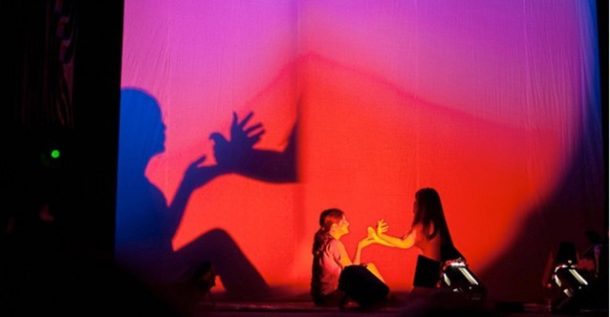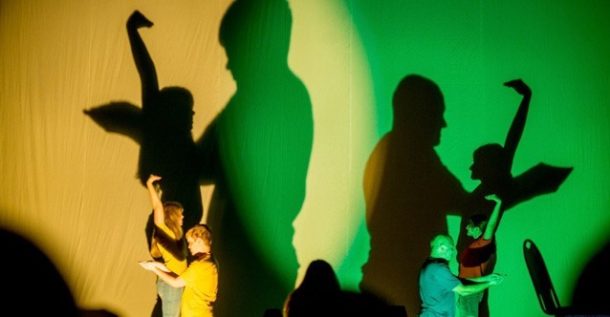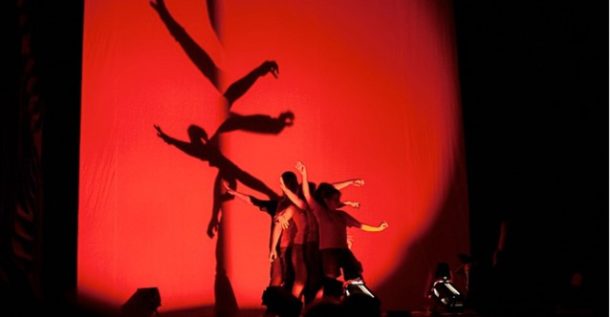The Shadow of My Soul is the first ever production of shadow theatre that was created and performed by completely blind actors. However, it is unique not only because of their outstanding performances but also because of the talent of the director Velemir Velev to transform blindness into an artistic means of expression on stage. This amounts to the creation of a new theatre language that provokes a very special and previously unseen type of communication with the audience.
In the first place, the show asserts that darkness is not a myth: neither the one that can engulf the souls, nor the one that could be caused by a physical handicap. On the contrary, the show proves that darkness could be a way of life! It starts with Velev himself appealing to the audience to close their eyes by putting their palms on them so that they can imagine life in darkness. Then, when one opens one’s eyes, one finds oneself in a literal dark space, and a cry of suppressed horror fills the hall until everyone realises that their eyes are fine and it is just dark in the room. That shock introduction is part of the performance itself – an option to emotionally be in someone else’s shoes and an adaptation of the senses into the unseen reality that the audience is about to experience.

The Shadow of My Soul. Photo Credit: Unseen Theatre Company.
In a short while small flames, like newly born souls, start sparkling here and there, and the actors’ faces and their shadows loom up on the stage and on a screen slightly above it – lonesome and groping in the darkness. A world is being discovered.
There is no text in The Shadow of My Soul. There is no pompous set design, no multimedia. Yet the audience witnesses a mission impossible: the blind actors draw with light without physically being able to see its source, create and enliven the shadows of their bodies without being able to observe the effect of their movement, combine images on the screen from a distance without being able to see their position or that of the others. In brief: they tell us in images about the meaning of life without being able to see the story.
The actors are in front of the screen so that the audience can fully see how they create the shadows and how they communicate. Moreover, they perform with their faces towards us and their backs to the screen. The lighting is on the floor, so that the shadows grow tall and almost reach the ceiling. The images on the screen constantly change, as if composed of smoke, evoking yearnings, dreams, disappointments, fears, hopes… The action on stage and the one on screen independently and reciprocally intertwine. Lovers’ embraces on stage become shadows of small turtles on the screen, touches become a marine world of fish, algae and crabs. Fear and mistrust turn into bristly hedgehogs, despair into a desert, hope into a salvage camel, understanding into a tree with birds, yearning for a fairer world into a flock flying to the limitless horizon… The actors search for each other, miss each other, while their shadows touch, embrace and find each other, or drift away.

The Shadow of My Soul. Photo Credit: Unseen Theatre Company.
Alongside all that, a parallel, so to speak, third action unfolds: two hands draw colourful impressions on the screen above the shadows in real time. And it’s as if these hands themselves yearn to touch and meet the paint with their fingers, while landscapes and human figures are born.
Although the performance has no plot, it has a kaleidoscopic story related via a mosaic of small event-images interwoven into an artistic and meaningful unity through the language of film editing. Perhaps this is the reason why every spectator sees the story in their own way.
Velev’s work on the show extends far beyond what is usually required from a director. He is the eyes of all actors, the tutor, the one who pre-creates and co-creates their world, drawing an imaginary picture of non-material dimensions in their minds. “I teach them,” he says. “I perfect the approach; it is not only about training, every single time I discover a way of reaching each one of the actors. And yet always, when they go on the stage, I’m stunned that I see something inexplicable. I have tried my hand with many of the best non-blind actors in the shadow theatre genre and, if blindfolded, in a few minutes they lose directions, misjudge distances to the screen and to the lights, regardless of the fact that they have engraved in their memory the visual image and the space. And here everything works.”
In 2005, Velimir Velev started a non-verbal theatre school, named “School for Vision,” for blind students in Sofia. This was a personal volunteer initiative unrelated to a social project or a funding program. His work with the students developed into a specialized motivation system focused on opening up in a psycho-motor way the senses for space orientation and an inner world vision in the absence of sight. This system includes: a specific initial body-preparation, training that aims at creating a visual control via the use of improvised materials and distance-operated puppet systems designed for the entire group, and in the end complex stage tasks related to artistic techniques and devices inherent to the shadow theatre, marionette theatre, theatre of masks, black-box theatre, etc. In brief, the concept at the base of the system could be summarized as “crossing the boundary of the impossible in and through art,” as Velev puts it in his School of Vision – Art and Therapy, Beyond Art Therapy (National Academy of Theatre and Film Arts, Sofia, 2019). Importantly, the School is open both for seeing and blind artists, as well as for anyone interested in attending or participating. And its name refers actually to this open scope: all participants are expected to recover their sight in some way or another – no matter if they can literally see or not, if they are actors or just audience; all are expected to acquire new eyes for the world, a new viewpoint on life and sight, an insight for their own existence.

The Shadow of My Soul. Photo Credit: Unseen Theatre Company.
This is how The Unseen Theatre Company was born. Now, several years later, without any exaggeration it could be said that the company’s artistic results are fully compatible with the strictest criteria of professional puppetry. Moreover, the actors are a source of inspiration thanks to their ability to do things inaccessible for the larger part of the seeing professionals when deprived of visual control. No wonder The Unseen Theatre Company has been gaining international acclaim. It is a recipient of the “Youth Democracy Award” of Bundeszentrale für politische Bildung, Bonn, Germany: for a project of value and sustainable contribution and powerful humane impact on all democratic society levels. According to Steffanie Rauprich of the International Jury, this is a unique combination between theatre and empowerment with a mighty impact on both the individual and social consciousness.
The Unseen Theatre and School of Vision refute the maxim that everything new is a well-forgotten old. Contrary to that, they are a proof that terra incognita in art still exists. Is everyone capable of reaching it? According to Velev, yes, it is possible as long as one does not seek mainly recognition as an innovator or avant-gardist. However, he sighs, today, theatre leans predominantly towards personal vanity, ambition and profit. “The skill to no longer be concerned with oneself only and completely devote to the others gives powerful artistic strengths and it is unquenchable source of ideas,” says Velev. “This is a simple secret that to the majority of people lies beyond what is visible.” According to him, the preservation of human values and ideals in our times of spiritual deficit should be every man’s mission, as the original mission of theatre actually is. And innovation makes sense only if it helps the audience to co-experience the theatrical action so that they can rediscover human proximity, tolerance and warmth. Indeed, The Unseen Theatre works for all of us who can see because it has a strong morally transforming effect.
It was at the end of the last century when Velev, also an actor and pedagogue, began a research on the Information Technologies as a spectacular phenomenon and their influence on human beings, and hence globally on art. He was driven by his concern that “in our information world, there is no emphasis on the spiritual, the moral, and the humane.” (The Eighth Direction of the World. The New Digital Technologies and the Traditional Spectacular Art, KuklArt, 2011, No. 5, pp. 60-61). Today, “we lack artistic and moral criteria along with an art of valuable content and adequate artistic means,” writes Velev in Digital Creativity: Advantages, Problems, Responsibilities, International Journal on Information Theories & Applications. Out of this concern was born the Virtual InterActive Theatre (VIA), with the aim to counteract the negative aspects of ICT on society.
Alongside that Velev started experimenting with a new genre on the border between puppetry and the theatre of body expression. Its most important samples were two shows. Thirst, which he did with graduates in puppetry of the National Academy for Theatre and Film Arts, Sofia, in which he carried out an original psycho-physical actors’ training with the only objects on stage being glasses filled with water. It was “something difficult to define… an image drawn without brushes and paint, like the ones Picasso drew with the smoke of his cigarette in a dimly lit room,” wrote Petar Zmiycharov, a prominent art critic. (Velimir Velev’s Thirst as Quenching the Passion for Theatre, KuklArt, No. 1, February 2008). What followed was the show Repentance, where the only objects on stage were wooden sticks. The result was a kinetic architecture in action.
Velev has now named his working method Matter-Body-Contact. Here is how he describes it: “It is based on the non-living matter (water, wood, etc. all the five elements) coming into contact with the human body and becoming the source of the actors’ stage imagination, simultaneously producing their movement as well as the logic of behaviour and communication. These then evolve into theatrical situations with themes and morals. In other words, the form generates content and then the content is shaped into a performance of a specific morality. The symbolic rationalisation of the non-living matter as a performance tool along with this matter’s structural interweaving into the theatrical action and into the dramaturgical plot adds philosophical depths to performances and produces a particular impact on the subconscious perception of the audience.”
Velev’s non-traditional approach to teaching has won him a Golden Hexagram for Exceptional Contribution to Local Culture and Arts in Montenegro and Croatia. He has also been appointed as Vrhunski Umjetnik (Best Artist) of the Osijek Arts Academy, Croatia.
Teaching is very important to him, since “human sensitivity is ubiquitous but it is lulled or buried to a great extent by the every day’s life and what matters is what and how one wakes it up,” says Velev. At the same time, “the audiences’ senses are also being dulled by the intensive information flows. We need a new meaningful artistic irritant – powerful, different, and discernible in the ocean of spectacles,” he adds.
The Shadow of My Soul from Velev and his unusual stage company is certainly one such great example: an “unseen theatrical phenomenon” that manages to deeply move and awaken the audiences from the hypnosis of their hectic lives.
Gergana Traykova is one of the few young critics in Bulgaria with a special interest in the symbiosis of drama and puppet theatre. She has been actively contributing to KuklArt, a prestigious national magazine devoted to puppet theatre, has worked on the daily bulletins of several theatre festivals, and last year was chosen to write the diary-journal of the laboratory work of the acclaimed puppet theatre director Vesselka Kuncheva on her production of The Queen of Spades by Pushkin. A graduate of the National High school of Stage and Film Design with a major in Light Design, Traykova has worked for a couple of years as a light-designer at the puppet theatre Hand in Plovdiv. She then obtained her BA in Theatre Studies and Management at the National Academy of Theatre and Films Arts in Sofia and is currently studying for her MA at NATFA

European Stages, vol. 13, no. 1 (Spring 2019)
Editorial Board:
Marvin Carlson, Senior Editor, Founder
Krystyna Illakowicz, Co-Editor
Dominika Laster, Co-Editor
Kalina Stefanova, Co-Editor
Editorial Staff:
Joanna Gurin, Managing Editor
Maria Litvan, Assistant Managing Editor
Advisory Board:
Joshua Abrams
Christopher Balme
Maria Delgado
Allen Kuharsky
Bryce Lease
Jennifer Parker-Starbuck
Magda Romańska
Laurence Senelick
Daniele Vianello
Phyllis Zatlin
Table of Contents:
- Introductory Note by Kalina Stefanova.
- “Andrzej Tadeusz Wirth (1927 – 2019) – White on White” by Krystyna Illakowicz.
- Lithuanian Marriage in Warsaw or The Last Production of the Great Eimuntas Nekrošius by Artur Duda.
- “My, Żydzi polscy [We, Polish Jews]”: A Review of Notes from Exile by Dominika Laster.
- A Report on the State of Our Society, According to Jiří Havelk in The Fellowship of Owners at VOSTO5, Prague, and Elites, at the Slovak National Theater, Bratislava by Jitka Šotkovská.
- About Life as Something We Borrow. On the Stages of Pilsen (In the 26 th edition of the International Theatre Festival There) by Kalina Stefanova.
- Redesigning Multiculturalism or Japanese Encounters in Sibiu, Romani, The Scarlet Princess, written and directed by Silviu Purcărete, inspired by Tsuruya Namboku IV’s Sakura Hime Azuma Bunshô by Ion M. Tomuș.
- About Globalization: A “Venice Merchant” on Wall Street, at the Hungarian Theatre of Cluj in Romania by Maria Zărnescu.
- The Patriots, Mary Stuart and Ivanov and the Rise of the Drama Ensemble of the National Theatre in Belgrade by Ksenija Radulović.
- The Unseen Theatre Company or How to See Beyond the Visible: The Shadow of My Soul and the Theatre of Velimir Velev by Gergana Traykova.
- Multilingual Pirandello, Understandable to Everyone: The Mountain Giants at the Croatian National Theatre “Ivan pl. Zajc”, Rijeka by Kim Cuculić.
- The return of the repressed: the ghosts of the past haunt Barcelona’s stages by Maria M. Delgado.
- A poetics of memory on the Madrid stage (2018) by Maria M. Delgado.
- The Danish National Theatre System and the Danish National School of Performing Arts: December in Copenhagen 2018 by Steve Earnest.
- Towards a Theatre of Monodrama in Turkey 1 by Eylem Ejder.
- Where Is Truth? Justiz by Friedrich Dürrenmatt, adapted and directed by Frank Castorf at the Schauspielhaus Zürich by Katrin Hilbe.
- Report from Vienna by Marvin Carlson.
www.EuropeanStages.org
europeanstages@gc.cuny.edu
Martin E. Segal Theatre Center:
Frank Hentschker, Executive Director
Marvin Carlson, Director of Publications
©2019 by Martin E. Segal Theatre Center
The Graduate Center CUNY Graduate Center
365 Fifth Avenue
New York NY 10016
European Stages is a publication of the Martin E. Segal Theatre Center ©2019
Martin E. Segal Theatre Center:
Frank Hentschker, Executive Director
Marvin Carlson, Director of Publications
©2019 by Martin E. Segal Theatre Center
The Graduate Center CUNY Graduate Center
365 Fifth Avenue
New York NY 10016
European Stages is a publication of the Martin E. Segal Theatre Center ©2019



